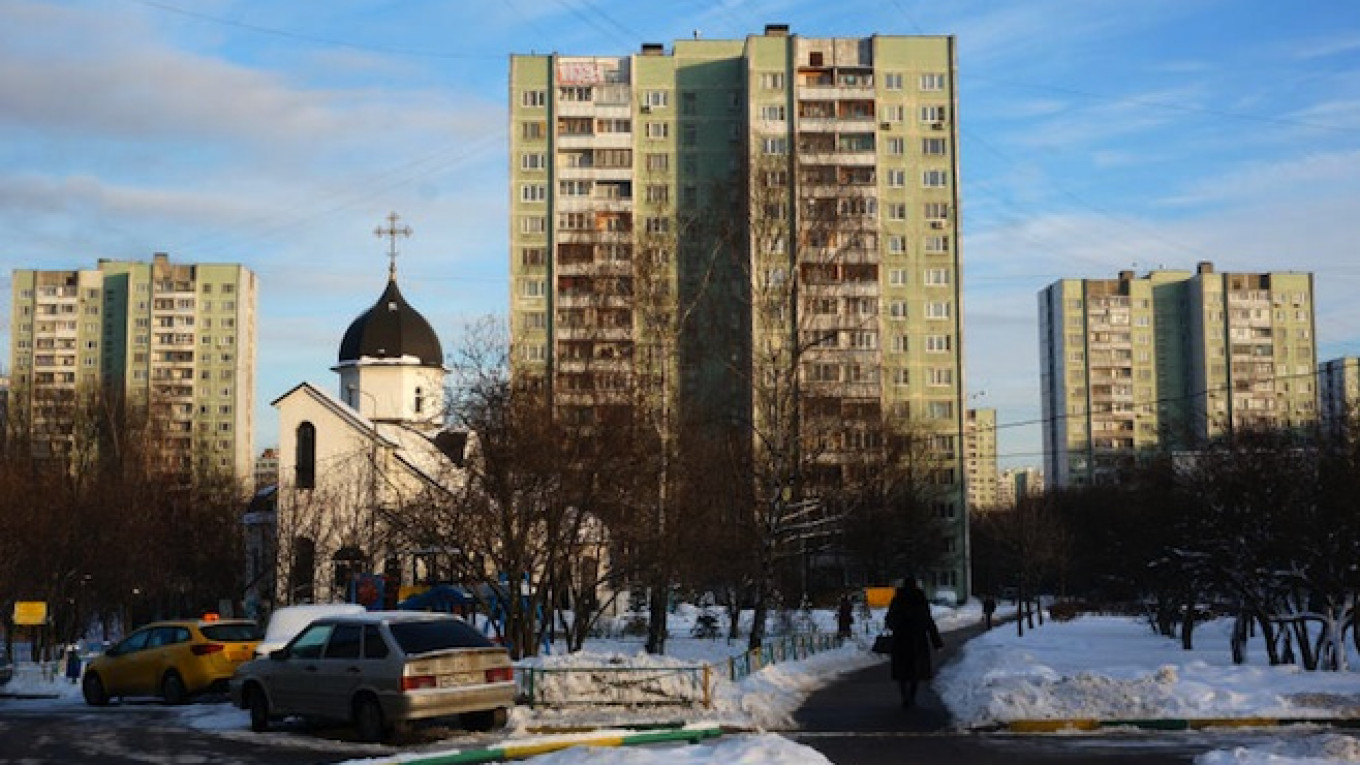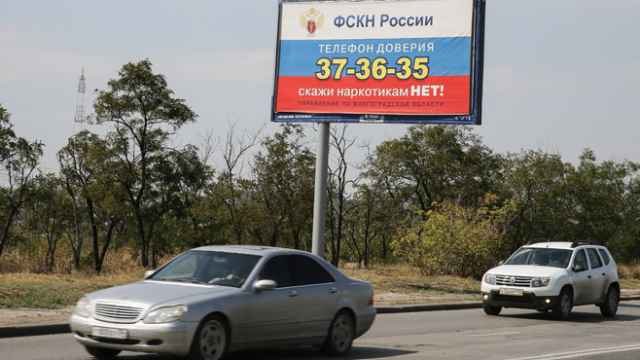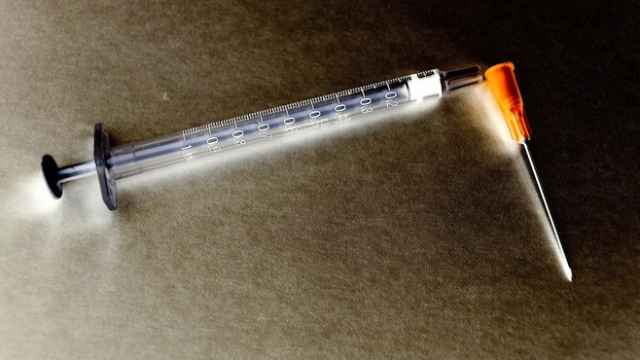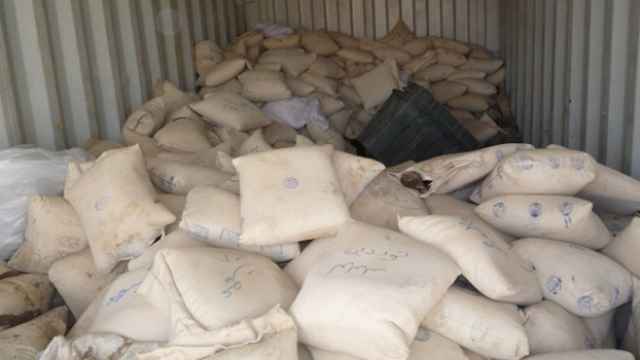In the dank stairwell between the fifth and sixth floor of his building in the northern Moscow neighborhood of Bibirevo, Pavel has made an unlikely discovery. Behind the trash shoot are plastic syringe caps and small empty bags. There are cigarette butts all over the floor. He points to a step blackened with spray paint. It stands as a mark on an opiate treasure map. Pavel has found a heroin stash point.
Today, Tramadol and codeine-based medications are no longer available in Moscow; Krokodil, an opiod derivative of codeine that was for many years a cheap replacement for the real thing in Russia, has been defeated; private rehab clinics have flourished, and yet — Bibirevo's heroin problem has only got worse. For locals like Pavel, petty crime and narcotics have become routine.
In February, district prosecutor Yevgeny Nepomyashy informed local internet bulletin Bibirevo: Our Home that drug-related crimes had nearly doubled, from 584 in 2013 to 946 in 2014. A query of the word "narco" on the site chronicles Bibirevo's year in crime: a suspicious chemist in January, a clandestine drug lab in May, and sidewalks graffitied with drug advertisements in July — to cite a few incidents.
Nepomyashy, who oversees cases in the city's entire northeastern administrative region, singled out Bibirevo as his main concern.
"The biggest problem in the region is Bibirevo. Here there are the most addicts, and accordingly, higher crime rates. They need to pay for their dose somehow," he said in the report.
But the prosecutor offered little explanation as to why that rate has been increasing.
"Bibirevo is one of the largest, most densely populated regions of the capital,' he said. 'Hence all these troubles."
The population of the region is nearly 160,000, with a density of over 24,000 people per square kilometer — a figure succeeded by only four other districts in Moscow, according to a recent census.
The way drugs are dealt in Moscow today makes Bibirevo — and other densely populated regions — particularly susceptible to low-level trafficking done by small operations that peddle their products in a "hide-and-seek" fashion. Buyers contact a dealer through ICQ messenger and pay for their drugs on electronic accounts like Qiwi-wallet. After proof of payment, a courier is sent to hide the drugs at a public stash point — anywhere from a nook in a garage roof to an empty cigarette pack in the grass. A packaging coordinator then informs the buyer how to find it. It's anonymous and low risk for both parties.
In this bedroom community, the presence of addiction is conspicuous, especially in the warm summer months when users scour the streets for the hidden drugs or doze on park benches. Police presence is notably absent and the scores of apartment blocks are unguarded.
Last December, the local government funded a project to install iron doors in place of the old wooden ones in apartment entryways as addicts were ripping them open to find drugs and inject in the stairwell.
Pavel, 35, lives in one of those buildings. It's a weathered 12-story block, 300 meters from the metro station where he works as a security guard. He claims that addicts are still getting in despite the new door.
"For about a week after they changed the door, there was a big sign with the code posted on it. The smart ones [addicts] memorized it."
Pavel says that even before changing the door, the addicts were protesting. "There were signs with information up in the elevator and around the building. Then, overnight, they were covered with obscene pictures and swear words."
Standing outside the building, Pavel points to a group of leathery-skinned men who are passing by.
"There they are," he says. "They leave needles on the stairs outside my flat. Christ, I have a four-year-old daughter."
When the lift in the building is broken, Pavel and his family effectively become prisoners in their own home. It's a long way down from the ninth floor. One on of his trips down, Pavel discovered the black step occupied by two strung out addicts cooking up their dose.
"I think there's a dealer in the building who pays the cops," he says. "Or there's a 'narkopriton.'"
'Narkopriton' is the Russian word for opium den.
In late June, police scored a minor victory with Operation Poppy, busting three opium dens in the Bibirevo region. Nine people and 450 grams of heroin were seized, local news reported. But it's unclear whether the bust will have any lasting-effect on Bibirevo's heroin crisis.
Russia's hard-line approach in treating heroin addicts means that abstinence rates are low. Methadone and other opiate-replacement therapies are strictly forbidden by Russian law. The best weapons on the market are sedatives and Naltrexone, a pleasure-blocking implant inserted in the lower abdomen for two months. In addition, 16 percent of narcologists still employ the Dovzhenko method. Alternatively known as coding, the method involves a therapist attempting to scare a patient into abstinence by convincing them they will be harmed or killed if they use again.
And, for one Bibirevo user, who asked to be identified under a pseudonym, there is something worse than the thought of withdrawals and death — it's being clean.
Oleg spends most days begging outside the Bibirevo metro station with a can of Baltika 9 beer. He leans on crutches with an outstretched palm, asking only certain women for 50 rubles; he gets to the point. He's got a gimp leg from a motorcycle accident in his teenage years and can't work. Just 24, he says the accident left him with painful post-traumatic arthritis and claims he uses heroin to kill the pain.
"It's nearly impossible to get any opiate painkillers, even if you're dying of cancer,' he says. "Plus, 'gary' [ a street name for heroin] is cheaper."
Although voted one of Moscow's greenest neighborhoods, Bibirevo exemplifies some of Russia's darker upward trends: crime and drug use. With nearly a million people infected with HIV and the world's largest population of injecting drug users. Russia is dope sick. And it needs something beyond self-medication.
Pavel sees that in the form of a good beating. He doesn't know fancy terms like opiate-replacement therapy nor seems to care. His reaction is visceral. "When I look out of the peephole and see some guy sitting on the stairs, I just want to go out and kick him in the face."
He says he's done it, too.
A Message from The Moscow Times:
Dear readers,
We are facing unprecedented challenges. Russia's Prosecutor General's Office has designated The Moscow Times as an "undesirable" organization, criminalizing our work and putting our staff at risk of prosecution. This follows our earlier unjust labeling as a "foreign agent."
These actions are direct attempts to silence independent journalism in Russia. The authorities claim our work "discredits the decisions of the Russian leadership." We see things differently: we strive to provide accurate, unbiased reporting on Russia.
We, the journalists of The Moscow Times, refuse to be silenced. But to continue our work, we need your help.
Your support, no matter how small, makes a world of difference. If you can, please support us monthly starting from just $2. It's quick to set up, and every contribution makes a significant impact.
By supporting The Moscow Times, you're defending open, independent journalism in the face of repression. Thank you for standing with us.
Remind me later.






